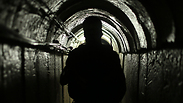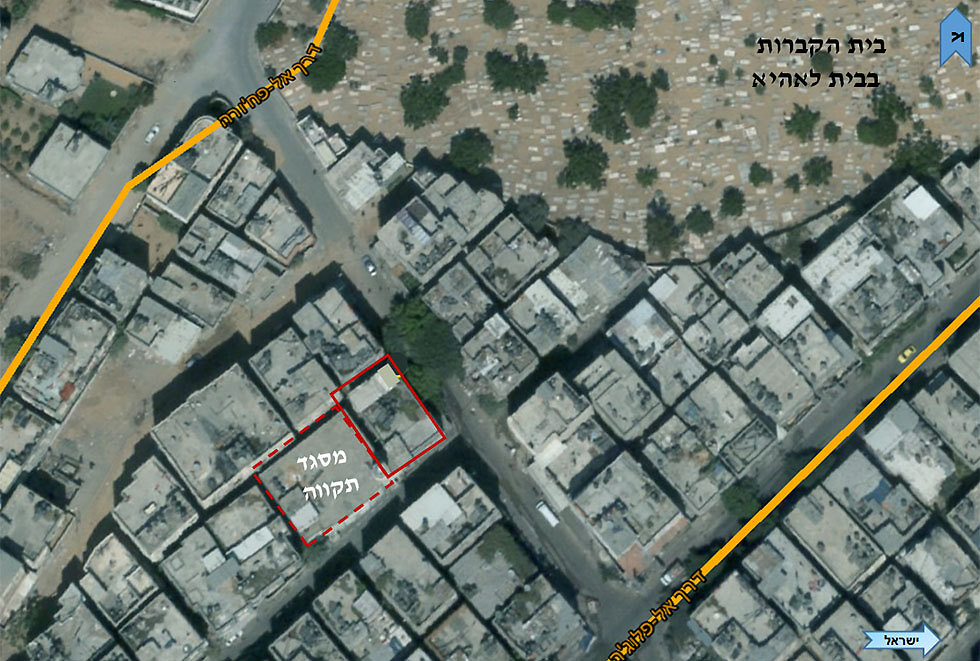
Hamas tunnel
צילום: רויטרס
Southern residents welcome hastening Gaza barrier construction
After IDF announces intentions to step up pace of subterranean barrier across Gaza border in effort to block Hamas infiltration into Israel, residents welcome ‘increased sense of security’ but yearn for long-term peace; ‘It’s a military solution, but not one to the problem in Gaza’ caused by Hamas, says resident.
Residents of Israeli towns situated in the Gaza region have praised the IDF’s recent announcement that it intends to accelerate the construction of its subterranean barrier on the southern border in a bid to preemptively thwart threats emanating from the Hamas-ruled enclave.

With the new hastened pace of work, the underground wall is scheduled to be complete within the next year-and-a-half to two years. The giant concrete slab will stretch across the entire border and also be topped with a six-meter security fence above ground.
Moreover, the high-tech and concrete barriers will be able to detect and destroy every tunnel identified as it approaches.
On Wednesday, GOC Southern Command Maj. Gen. Eyal Zamir said nothing would deter Israel’s military from constructing the barrier designed to deliver a decisive blow or severe setback to Hamas’s terror project.
“The barrier against the Gaza Strip will be built even if it means fighting a justified incursion against Hamas,” said Zamir.
Mayor of Sderot Mayor Alon Davidi, whose city has been one of the most seriously affected by Hamas terror network, said that he “absolutely trusts the general.”
“I see the campaign against a Hamas to be a long-term one. That’s why we need to look at the long-term and short-term situation. Whether it is when there is rocket fire, or when we conduct operations and there is no quiet, we are ready to take any situation to restore quiet,” said Davidi.
“If the security apparatus decided that the barrier project will quash Hamas’s motivation to operate against us, and in practice will neutralize the threat of terrorists penetrating through tunnels or land, we as a civilian system will be partners in the effort and will provide all required support,” the mayor added.
“If the situation deteriorates, we will know how to handle it and enable the IDF to complete what it has to. The barrier is a project that will significantly improve the sense of security among the residents.”
Head of the Sha'ar HaNegev Regional Council, Alon Schuster, also expressed his satisfaction with the progress being made on the barrier, saying it is “another step toward the defense of the residents in the Gaza region and evidence of this is in the demographic growth that we are experiencing at this time.
“More and more families are deciding to settle in our communities, some of which are far from the fence by hundreds of meters.”
Indeed, some of the residents themselves agreed with Schuster, saying that there was undoubtedly a palpable sense of bolstered security.

Building hilighted in red is a mosque between two Hamas tunnels (Photo: IDF Spokesperson's Unit) (צילום: דובר צה"ל)
“It made me very happy to know that the project is being significantly accelerated and will actually provide us with a defense against the most concerning threat—the threat of tunnels,” said Yifat Ben Shushan, a resident of Netiv HaAsara located in the Negev. “It absolutely does increase my sense of security as a resident and a mother.”
Ben Shushan added that in her opinion, the barrier constitutes a military solution to the precarious patterns of intermittent wars in the area.
“But it isn’t a solution to the problem of Gaza,” she added, saying that the situation in the strip has a direct impact on the Israeli towns nearby.
“On the other side of the fence there are close to two million civilians who live under the Hamas regime and are in a serious humanitarian situation,” she acknowledged.
“There is a military solution but in order for there to be lasting quiet for the long term, a clear policy must be implemented in everything connected with the Gaza Strip. Unfortunately, that is not happening,” she noted before offering a somewhat gloomy prediction if the deadlock continues unabated.
“The problem with Gaza will continue even after the barrier is up. The scenario in which many people are attacking the fences and trying to infiltrate Israel because of the humanitarian crisis is extremely concerning, and is already at our doorstep.”










